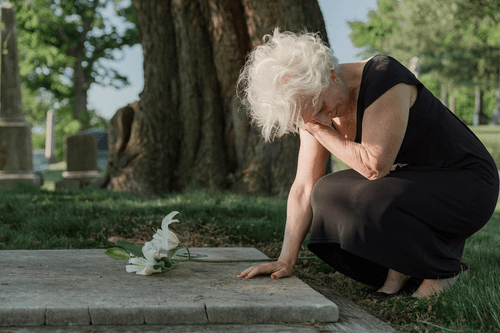How Moving Can Relieve Grief for Seniors
There is never an easy path forward following the loss of a loved one. Although some parts of grief are universal, much of the process is unique, and the path toward relief for one person may look entirely different than for another. One way to look toward the future after a death is to consider moving. Living spaces hold memories; for some people, this can be a comforting reminder of the person they’ve lost. For others, however, every corner or doorway can bring back a painful feeling of grief and sadness. In these situations, finding a new space and a fresh start can be the kindest thing to do for yourself.

What Living Space Is Best?
Take some time to consider your options and find the best living space for you. For example, if the person who died was your primary caregiver, it may make sense to move into assisted living. Often when a spouse or family member passes away, their loss is felt in practical, as well as emotional ways. Many facilities provide meals, offer gyms and other amenities, and have medical staff on hand. If you’re interested in learning more or need help finding the right facility, there are advisors throughout Seattle who can help you make this important decision. The median annual cost of assisted living in the state of Washington is around $66,000.
It’s also worth considering whether a smaller space makes sense for your specific needs. Many seniors find they want to downsize after the loss of a spouse or family member. A bigger house can feel particularly empty, which can ultimately highlight your grief. By moving to a smaller space, you’ll find your living situation much more manageable.
Preserving Memories
It’s normal to feel an additional sense of loss at the thought of moving out of your shared home. However, there are plenty of ways to preserve memories that don’t require living within those walls. For example, you can make a photo album of all the lovely pictures taken within that house. Or, you can make a model version of the home, or commission a painting. Wall art, sculptures, and other décor can travel with you to your new space, allowing you to bring along the memories you want to hold on to.
Practical Matters
There are several practical matters you must consider during a move. For example, if you owned the space you currently live in, you’ll need to decide if you want to sell, rent, or hold on to the property. If you do decide to sell, you can use the profits from your sale to go toward your next living space. Rental income, as well, can make your new home more affordable. Research the market to figure out which path forward is best for you.
You’ll need to decide whether you want to hire movers. If you have a large family or friend group full of able-bodied individuals, you may not need to. However, hiring movers for the day can make things go much more quickly, and may put less stress on both you and your loved ones.
If you’re downsizing, consider which items you want to bring along with you. Go through the remaining items and figure out which you’d like to sell, donate, or give away. It may be painful to make these decisions about your lost loved one’s possessions. Ask a trusted family member to help you make these decisions, and plan something nice for yourself afterward. Be prepared to take breaks, or even split the process up over several days. This may be an intense process, and giving yourself permission to take time will make it easier.
There are many ways to handle grief, and moving can be a powerful option. By giving yourself a new environment, you can look toward the future. Remember: Being away from a space will not rob you of the time you spent there. It may, however, give you the ability to move on.
Photo Credit: Pexels






